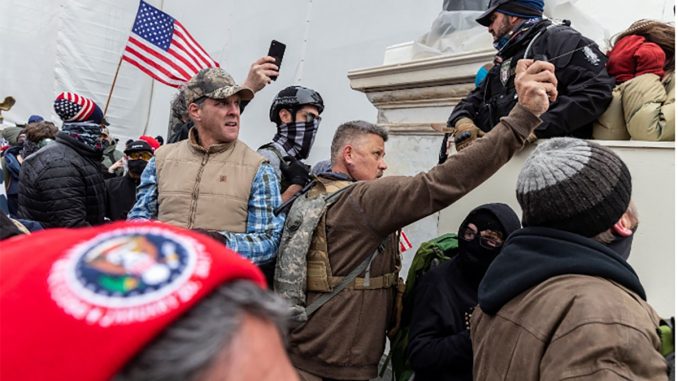
Christopher John Worrell, a 1990 Greenport High School graduate and self-described member of the Proud Boys extremist group, was sentenced in federal court in Washington, D.C., last week to a decade in prison after being found guilty of assaulting police officers with pepper spray during the Jan. 6, 2021, Capitol riot.
Prosecutors had argued in court papers that Mr. Worrell, who lives in Naples, Fla., was on the front lines of the assault on the U.S. Capitol building.
At a pivotal moment in the assault, Mr. Worrell “unclipped a canister of pepper spray gel from his tactical vest, and discharged a stream of pepper spray gel toward law enforcement officers … The pepper spray gel Worrell used is marketed by its manufacturer as having ‘double the average strength’ of other pepper sprays, and being ‘67x hotter than hot sauce,’ providing ‘Maximum Stopping Power’ ” prosecutors said.
Court records include numerous photos that appear to show Mr. Worrell at the Capitol that day, spraying the pepper spray gel and marching with groups of Proud Boys.
“Mere minutes” after Mr. Worrell sprayed the gel at officers, prosecutors said, “the line of officers was breached, and a surge of rioters entered the seat of this nation’s legislative branch.”
Following his conviction last May, Mr. Worrell fled and then faked an opioid overdose when he was caught, authorities said in court records.
Last August, four days before his scheduled sentencing, “Worrell cut off his GPS ankle monitor in a Walmart parking lot and fled his residence,” prosecutors wrote in a sentencing memo filed last month in federal court.
Mr. Worrell’s disappearance prompted a six-week FBI manhunt, and when he was apprehended after sneaking back into his Naples home , authorities said, he faked the drug overdose.
When agents entered the home, they found Mr. Worrell “seemingly unresponsive, with an opened bottle of opioid prescription medication in his hand,” according to the memo.
“They performed what they thought were lifesaving procedures and transported Worrell to the hospital. This was, the government later learned, all a ruse — Worrell pretended to have a medical emergency as a ‘delay tactic’ to stall the government’s investigation,” the memo states.
The sentencing document argues that Mr. Worrell’s actions were “not some temporary lapse in judgment.
“Worrell was transported to the hospital, where he stayed for five days before he was medically cleared by doctors who believed he had overdosed on opioids,” it states.
When they entered his residence, FBI agents also found night-vision goggles, a bag containing new camping equipment and about $4,000 in cash, according to prosecutors.
Prosecutors, who had sought a 14-year sentence, called Mr. Worrell’s actions “galling” in the sentencing memo.
“This court has exhibited graciousness towards, and patience with, Worrell. Because of Worrell’s medical conditions, this Court released Worrell in November 2021; opted in August 2022 not to take him back into custody despite his bond condition violations; and in May 2023 concluded that his medical condition was an ‘exceptional reason’ not to remand Worrell pending sentencing … Yet Worrell repaid the Court’s trust in him by becoming one of the few Jan. 6 defendants to have fled before trial or sentencing. This is galling.”
At his sentencing, Mr. Worrell, who has a rare form of lymphoma, told a federal judge that he feared his cancer would spread during a long prison sentence, according to the Associated Press.
“I acted out of severe mental anguish and very genuine fear for my life,” he said. “I am truly sorry and I hope you can find it in your heart to forgive me.”
More than 1,200 people have been charged with federal crimes related to the Jan. 6 riot, according to an AP review of court records nationwide. More than 700 have been sentenced and roughly two-thirds have received time behind bars, the AP reports.



